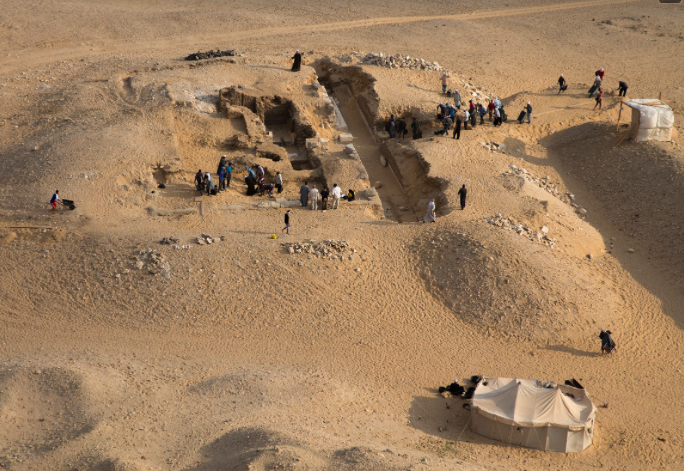Egyptian Tomb Of Kaires, 'Keeper Of The Secret,' Discovered 4,000 Years Later

An ancient Egyptian tomb, dating back more than 4,000 years, belonging to the "sole friend" of an Egyptian pharaoh and "keeper of the secret of the Morning House" has been discovered near a pyramid at Abusir. The burial site contains the remains of a small chapel and a tomb with inscriptions referring to a priest named Kaires.
“The burial chamber of Kaires has been looted already in antiquity, but in front of the limestone sarcophagus, his granite statue with remnants of colors and further titles has been somewhat miraculously preserved in its original location,” a statement detailing the findings said. “It is these titles that indicate Kaires’ exceptional career.”
According to researchers, "the tomb is located in the heart of the pyramid field of the 25th and 24th centuries BC, i.e. the reign of the 5th Dynasty of the Egyptian Old Kingdom in an area, where only members of the royal family and the highest state dignitaries of the time were buried."
The archaeologists aren't sure which pharaoh the inscription is referring to, but it could be Neferirkare, the statement noted.
"Kaires was the sole friend (of the king), overseer of all king’s works, keeper of the secret of the Morning House, steward of the royal palace, foremost of the House of Life, inspector of the priests serving in the pyramid complexes of kings Sahure and Neferirkare, priest of the goddess Hathor, mistress of the sycamore, in Cusae (a city in southern Egypt), custodian of the two thrones (i.e. of southern and northern Egypt), as well as a holder of several other titles," according to the statement from The Czech Institute of Egyptology, based at Charles University in Prague.
The Morning House was described as the place where the pharaoh got dressed and ate breakfast. The House of Life was "an institution, where Egyptians stored texts recorded on papyrus scrolls containing their knowledge and religious-philosophical treatises."
While it is unclear if Kaires was truly a "sole friend" to one or more pharaohs, it is believed that he was highly regarded judging by his elaborate burial, the archaeologists noted.
“Even though the expedition is still running and the final analysis of all data and information collected will take a much longer time, it can be said even at this stage of works that this is a unique discovery of a tomb of an exceptional figure of the history of Egypt of the 3rd millennium BC,” the archaeologists wrote in the statement.
They continued: “Kaires’ titles place him at the level of the viziers (prime ministers) of the time, whereas the architecture of his tomb completely exceeds the contemporary customs, and the full appraisal of this fact will only be possible after further investigation.”
© Copyright IBTimes 2024. All rights reserved.





















